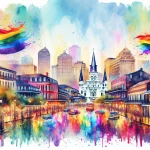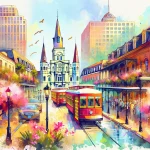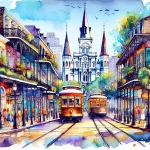New Orleans, the Crescent City, has long been a melting pot of spiritual traditions, blending African, Caribbean, and European influences into a rich tapestry of mystical practices and beliefs that captivate visitors and locals alike.
In This Article
TL;DR
- New Orleans harbors age-old conjure and spiritual customs rooted in African and Haitian origins.
- Renowned figures like Marie Laveau and Doctor John have shaped the city’s voodoo heritage.
- Conjure remains an integral part of New Orleans culture, influencing art, music, and cuisine.
The Roots of New Orleans Conjure
The roots of New Orleans conjure trace back to the African and Haitian spiritual traditions brought by enslaved individuals. These customs melded with European folk magic and Native American practices, giving rise to the unique New Orleans voodoo and hoodoo traditions known today.
African slaves carried a rich spiritual heritage, including the veneration of deities like Legba, Erzulie, and Damballa. These deities were often syncretized with Catholic saints, allowing slaves to continue their spiritual practices under the guise of Christianity. Haitian immigrants, fleeing the Haitian Revolution in the early 19th century, brought their own voodoo traditions, further enriching the spiritual tapestry of New Orleans.
European folk magic, particularly that of the French and Spanish, also shaped New Orleans conjure. Practices like using charms, amulets, talismans, herbs, and roots in magical workings can be traced to these European influences.
Native American spiritual practices, particularly those of the Choctaw and Chickasaw tribes, contributed to the development of New Orleans conjure as well. The use of herbs, roots, animal parts, and the belief in the power of dreams and visions stem from these Native American influences.
Notable New Orleans Conjurers
Marie Laveau
Perhaps the most renowned figure is Marie Laveau, known as the Voodoo Queen of New Orleans. Born in 1801, Laveau was a free woman of color who became renowned for her powerful spiritual workings and ability to communicate with the dead. She held elaborate voodoo ceremonies in Congo Square, drawing crowds of both black and white spectators.
Doctor John
Another notable conjurer was Doctor John, also known as the Gris-Gris man. Born in 1800, Doctor John was a free man of color who became famous for his powerful charms and amulets, known as gris-gris. He was said to cure any ailment and protect his clients from harm.
Reverend Zombie
In more recent times, Reverend Zombie has become a well-known figure in the New Orleans voodoo scene. Born in 1958, Reverend Zombie is a voodoo priest and the owner of the New Orleans Historic Voodoo Museum. He has been featured in numerous documentaries and television shows about voodoo and has worked to preserve and promote the traditions of New Orleans conjure.
Conjure Practices and Beliefs
New Orleans conjure encompasses a wide range of practices and beliefs, many rooted in African and Haitian spiritual traditions. One common practice is the use of charms, amulets, and talismans to protect against harm and bring good luck. These objects can be made from various materials, including herbs, roots, bones, and even human hair.
Herbal medicine and magical remedies are also an important part of New Orleans conjure. Practitioners use a wide range of herbs and roots, such as John the Conqueror root, Devil’s Shoestring, and Black Cat bones, to create powerful spiritual workings. These remedies can be used to cure ailments, attract love, and even curse enemies.
Divination methods, such as tarot card readings and bone readings, are commonly used in New Orleans conjure. These methods allow practitioners to communicate with the spirit world and gain insight into the future.
Spiritual possession and communication with the dead are also important aspects. Practitioners believe the spirits of the dead can be called upon to provide guidance and assistance in spiritual workings. In some cases, practitioners may allow themselves to be possessed by these spirits to channel their power.
Conjure in New Orleans Today
Despite time’s passage, conjure remains an integral part of New Orleans culture today. Visitors can still find numerous voodoo and conjure shops in the French Quarter, offering charms, amulets, spiritual readings, and consultations.
One popular conjure shop is Reverend Zombie’s Voodoo Shop, located at 723 St. Peter Street. The shop offers a wide range of voodoo and hoodoo supplies, including candles, oils, and incense, as well as spiritual readings and consultations. Reverend Zombie himself is often on hand to offer guidance and advice.
Another popular shop is Voodoo Authentica, located at 612 Dumaine Street. The shop offers voodoo and hoodoo supplies, spiritual readings, and workshops on topics like candle magic and ancestor worship.
Guided cemetery and voodoo history tours are also popular, offering a glimpse into the city’s rich spiritual history and visits to graves of notable conjurers and voodoo queens like Marie Laveau.
Modern practitioners are working to keep the traditions alive, offering workshops and classes on herbal magic, divination, and spiritual healing. Some even offer apprenticeships for those looking to deepen their knowledge and skills in conjure.
Conjure has also influenced New Orleans art, music, and cuisine. Voodoo-inspired artwork can be found throughout the city, musicians like Dr. John have incorporated conjure elements into their music, and chefs have created dishes inspired by the city’s spiritual traditions.
Controversies and Misconceptions
Despite its rich history and cultural significance, New Orleans conjure has often been subject to controversy and misconception. Hollywood depictions of voodoo have often been sensationalized and distorted, portraying the practice as evil and dangerous, leading to widespread misunderstanding and fear.
There have also been concerns about cultural appropriation and exploitation of New Orleans conjure. Some practitioners have accused outsiders of profiting from the tradition without fully understanding or respecting its roots and significance.
It is important to distinguish between authentic practices and tourist traps when exploring New Orleans conjure. While there are many reputable practitioners and shops in the city, there are also those who seek to exploit the tradition for financial gain. Visitors should do their research and seek recommendations from trusted sources before engaging with any conjure practices or practitioners.
Conjure’s Cultural Significance
Despite the controversies and misconceptions surrounding it, New Orleans conjure remains an important part of the city’s cultural heritage. The tradition has played a significant role in preserving African diaspora traditions and providing spiritual comfort and practical aid to those in need.
Conjure has also been a source of inspiration for countless artists, musicians, and writers over the years. From the voodoo-inspired paintings of Robert Tallant to the haunting melodies of Dr. John, the tradition has left an indelible mark on the cultural landscape of New Orleans.
Perhaps most importantly, conjure has added to the unique mystique and allure of New Orleans. The city’s reputation as a place of magic and mystery is due in no small part to the enduring presence of conjure and voodoo in its history and culture.
Experiencing Conjure Culture
For those looking to experience New Orleans conjure culture firsthand, there are many opportunities. Visiting reputable conjure shops and practitioners is a great way to learn more about the tradition and perhaps participate in spiritual workings or consultations.
Touring historical conjure sites, such as the tomb of Marie Laveau in St. Louis Cemetery No. 1, can provide insight into the rich history of the tradition. However, it is important to approach these sites with respect and reverence, as they are often considered sacred by practitioners.
Address: 3421 Esplanade Ave, New Orleans, LA 70119
Supporting events and organizations that promote and preserve the tradition of New Orleans conjure is another way to engage with the culture. The New Orleans Voodoo Museum, for example, offers exhibits and workshops on the history and practices of voodoo and conjure.
Address: 724 Dumaine St, New Orleans, LA 70116
Phone: (504) 680-0128
Hours: Monday-Sunday 10AM-6PM
Ultimately, the key to experiencing New Orleans conjure culture is to approach it with an open mind and a willingness to learn. By taking the time to understand the history and cultural context of the tradition, visitors can gain a deeper appreciation for the magic and mystery that makes New Orleans such a unique and captivating place.






